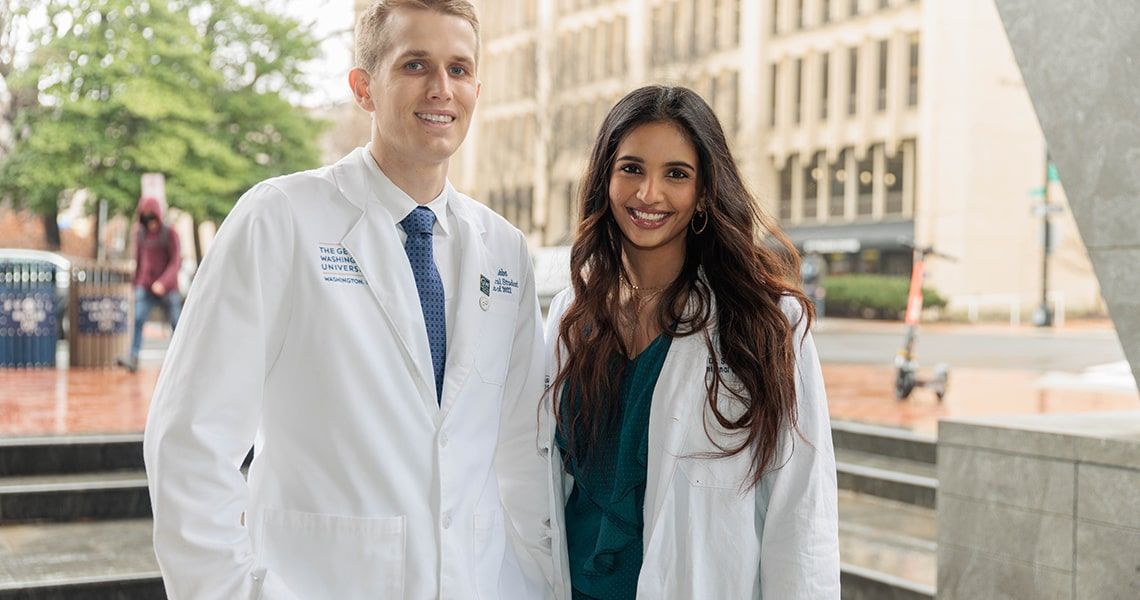Inspiration, for many medical researchers, can emerge from a spectrum of experiences: mundane observations, a passing thought, critical examinations of curious patterns. Wyn Dobbs, a third-year medical student at the George Washington University (GW) School of Medicine and Health Sciences (SMHS), and Shaitalya Sri Vellanki, MD, a second-year internal medicine resident at GW SMHS, discovered a boots-on-the-ground approach proved most fertile for ideas.
As the inaugural recipients of the Akman Innovation Fund — created in honor of Jeffrey S. Akman, MD ’81, RESD ’85, former GW SMHS dean, and designed to foster ideas, support mentorship, and promote clinical innovation — the two are delving into research that targets two areas: the exploration, understanding, and treatment of COVID-19, and innovative approaches to eliminating health disparities.
As the COVID-19 pandemic has restructured society and medicine, it has also been a powerful influence on Dobbs. “COVID-19 has shaped much of my outlook in the field of health care,” he explains. “At its onset, I immediately took action to help my community both combat the virus and better understand it.”
He started as a contact tracer for the Mississippi Department of Health before shifting to more clinical work at GW SMHS. He served as a research assistant on the Moderna COVID-19 vaccine trial at GW and as senior research assistant and project manager of the GW Medical Faculty Associates (MFA) COVID-19 Recovery Clinic and Biorepository.
While researchers are still untangling the effects of post-acute sequelae of COVID-19 (PASC), or Long COVID, Dobbs, thanks to his time at the clinic, has identified a potential relationship between the disease and pre-existing asthma. With the Akman Innovation Fund, he’s planning to use the clinic’s unique data to pinpoint patients with asthma and varying levels of COVID severity to “observe any differences in pulmonary symptoms.”
“Understanding the relationship between PASC and asthma is incredibly important to characterize the risk profile of patients suffering from asthma,” Dobbs said. “Findings from this study can lay the groundwork for future investigations in determining the best treatment regimens for these patients.”
Vellanki, meanwhile, discovered emerging narrative themes from the niche corner of creative writing and clinical work in underserved Louisiana communities.
“Prior to delving into clinical research, I grounded my passion for medicine by volunteering in impoverished communities and homeless clinics in downtown New Orleans during medical school,” she says. “Serving this patient population sparked my interest in journalism and narrative medicine. I began to creatively write patients’ stories to be shared in online literary journals and realized the common themes always centered on barriers in accessing medical care, treatments, and follow-up appointments.”
Vellanki focuses on cardiorenal medicine, the study of how obesity and metabolic conditions promote the progression of heart and kidney disease. She has hypothesized that a multidisciplinary team supporting a primary care physician, rather than a group of siloed specialists typical with a referral-based care model, will be more effective for patients with heart failure and chronic kidney disease.
This cohesive team approach, which has been the mission of the GW MFA-based multidisciplinary Cardiorenal Program, could create better treatment plans, ensure better implementation rates for guideline-directed medical therapies, and help overcome patients’ barriers in accessing complex care.
“I hope to present the data I obtain in both the research literature and narrative medicine/medical journalism spaces with the goals of improving access to advanced medical treatments, decreasing barriers to access sub-specialty care, and, most importantly, promoting patient advocacy,” she says.
As part of the mentorship component of the fund, Dobbs will work with Adrienne Poon, MD, MPH, assistant professor of medicine at GW SMHS, and Vellanki with Janani Rangaswami, MD, professor of medicine with the Division of Nephrology at GW SMHS and the GW MFA, director of the GW MFA Cardiorenal Program, and chair-elect of the Council on the Kidney in Cardiovascular Disease of the American Heart Association.
Akman, who served as dean of GW SMHS, as well as vice president of health affairs and Bloedorn Professor of Administrative Medicine, positioned the school as a pacesetter in medical education. Among his accomplishments were leading the transformation of the MD and physician assistant program curricula to emphasize new technologies and educational modalities, the construction of the CLASS Center, the expansion of the health sciences and doctoral degree programs, and the development of the clinical public health curriculum to build on GW’s proximity to Capitol Hill. He also created the Office of Diversity and Inclusion, which has played a pivotal role in attracting a wider range of talent to the SMHS MD Program. Akman stepped down from his leadership positions in January 2020.
“We are so excited to have chosen our first Akman Innovation Fund grantees,” says Barbara L. Bass, MD, vice president for health affairs, dean of GW SMHS, and CEO of the GW MFA. “They have developed exciting research projects with their faculty mentors – projects that may lead to discoveries and methods to improve patient care and outcomes. Their innovative investigations truly exemplify what it means to be an ‘Akman scholar.’”



